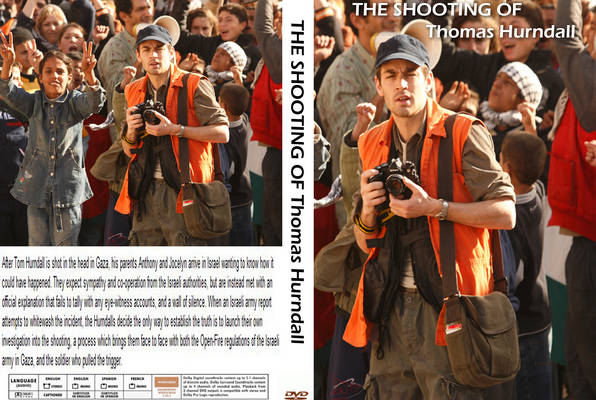
THE SHOOTING OF THOMAS HURNDALL
UK, 2008, 90 minutes. Colour.
Stephen Dillane, Kerry Fox, Mark Bazeley, Ziad Backry, Harry Treadaway, Jodie Whittaker, Kika Markham.
Directed by Rowan Joffe.
This television film is based on actual events, the death of a young photojournalism student who was shot in the head by an Israeli army sniper in April 2003. He was rescuing children and was wearing the clothes of an aid organisation.
The film shows the grief of the family, their visit to Jerusalem, the recovery of the body of their son who was in coma and later transferring him to England. The father makes a decision to investigate the case, make protests to the Israel government – which are ignored for quite a time. The case is taken up by the media. When he sends his report of his investigations, there is a meeting with Israeli authorities.
The young sniper for the Israeli army, a Bedouin Arab, age twenty, is arrested, interrogated and made the scapegoat for the event. He was found guilty of manslaughter but given a sentence much in excess of the normal sentence for manslaughter.
The film won BAFTA awards for Stephen Dillane and for director Rowan Joffe. The film won a SIGNIS award at the Monte Carlo festival in 2009.
Stephen Dillane is very good as the father, divorced from his wife, a lawyer, who wants to pursue the case to the end. Kerry Fox is also very good as his wife. Mark Bazeley is a sympathetic army liaison officer in Israel.
The film raises the issues of the clashes between Israelis and Palestinians, the conflict since the establishment of the state of Israel in 1948, the oppression of the Palestinians by the Israelis, the retaliation by the Palestinians. At the centre is the young Bedouin Arab who is loyal to the army, resents the students coming to Palestine and photographing his post. The film also shows what a small group of people can do if they continue their protest, make their case known, call to account the authorities.
The film was directed by Rowan Joffe, son of Roland Joffe, who was to go on to make the new version of Graham Greene’s Brighton Rock.
1. The film based on actual events, topical, made five years after the events?
2. The opening, the situation in Gaza, Thomas as a student, photography, his going to Palestine, the organisation, his clothing, his camera? His motivation, wanting to discover the truth for himself? Photographing the post? Rescuing the child, his return? His being shot? The Palestinians carrying him to safety? Seeing the events at the end in the light of the film and what happened? The plight of the killer?
3. Audiences and their attitudes towards the Palestinians, Israelis, the conflict? The plight of the Palestinians, their land, lack of freedoms? Israel and its fear of the Palestinians? Guns, shooting, indiscriminate shooting, the rules of engagement? The use of Bedouin snipers? Israeli officers? Israel and its rights? The attacks of the Palestinians? Action?
4. The audience and identifying with Thomas Hurndall? With the Hurndall family? Ordinary, British, their expectations in coming to Israel, the legation and the applications, the sympathy of the army liaison officer, expectations of Tony Blair as prime minister and the parliament? The Israeli authorities refusing to see them?
5. The breaking of the news to Jocelyn at school, the phone call to Anthony? Jocelyn and the information, telling the children? Phoning Anthony, his controlling response? The background of their divorce?
6. The visit to Israel, the landscapes of Israel, Jerusalem? Their response to the situation? Their going to the village?
7. The issue of the Palestinians and the media concern? The shooting of Palestinians? The shooting of one Briton and the media emphasis? The justice in this? Anthony Hurndall acknowledging this?
8. Anthony and Jocelyn, their children, Thomas in a coma, the care and the hospital, the vigils, Billy camping outside? The younger boy and the effect? Billy and the confrontation of the soldiers in the mess hall? The children returning home, the care of Thomas in coma? The effect of seeing his body, for the audience, for the family?
9. Anthony and his visit, with the guide, the translator, the information, Anthony and Jocelyn going to the Palestinian village? The mother whose child was saved, the thanks? The elders of the village?
10. Anthony and his feelings, British and superior? His photos, weighing up the evidence, the positioning of the post, the aim of the guns? His report?
11. Tom, his sympathy and help? His army liaison role? The officials, diplomacy, the faux pas?
12. The toll on everybody, the meal, the discussion about falafel, Fred and Billy, Sophie? The return home?
13. The delay with the Israelis offering to meet? The army, the officials, the straight talk, evading the issue?
14. The young soldier, his age, Arab Bedouin, the vigil, his observing Thomas, trigger-happy, his resentment towards Thomas? His OC and the report, the arrest? The interrogation, his anger, the rules of engagement? The background of his personal life, his home, his family, prayer? Identifying Israel as his country? The sentence, his being upset? Its severity?
15. The achievement of the Hurndalls, holding Israel to account? Encouraging other individuals and groups to take their stand in similar circumstances?